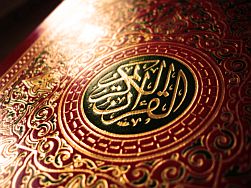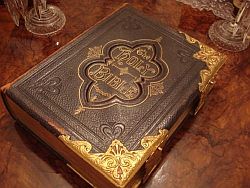 photo by Crystalina
photo by Crystalina
 photo by serpentineantiques.co.uk
photo by serpentineantiques.co.uk
Both the Christian and Islamic faiths depend on revelation in order to know anything about God beyond what can be learned through observing nature. Muslims claim that the Quran is the eternal Word of Allah, sent down to earth, complete in its original form and unchanged. Christians, on the other hand, believe that Jesus Christ is the eternal Word of God, sent down to earth, complete in his original form and unchanged. The New Testament is held to a lower standard than that of the person of Jesus Christ upon which it is based: Is it eternal? No. Was it sent down from heaven? Inspired, but… no, at least not in the Quranic sense. Was it complete in its original form? Yes. Was it changed? Yes, but we know where the changes are for the most part. For both the Quran and the New Testament, the revelation and preservation of the ancient texts is of utmost importance, for they give us confidence that what the scriptures declare about God is reliable. The problem is: If both scriptures tell us contrasting views of God/Allah, which is reliable and trustworthy?
I’ve had the pleasure of engaging in an online conversation with several Muslims on YouTube on this subject. I hope to use this post as a vehicle for continuing those conversations as the YouTube comment mechanism can be uncooperative at times. As I have a day job, this interaction will require patience. Also, I’ll endeavor to be as informed, truthful and fair as possible, so careful research will be required. Please stay tuned!
Editor’s Note: This thread was moved from the main “Ask Me Anything” page. It was based on comments that originated from the YouTube video “A Guide To Missionary Tactics For MUSLIMS” by Radush Shubuhaat. Look for the thread by “A Berean” that begins “So much cynicism in less than 15 minutes…”

Hello, it's me, Stoyanovich, tis not my real name, call me Thoriq.
It's a nice site you've got in here, mashaAllah, i might even make one meself.
So.. Um, i want to learn more about christianity because Allah ordered me to learn about the Bible, well if i can find one without being changed overtime i would 100 percent believe it, but it's still recomended by the prophet to study it anyways. . In what verse? I do not remember, but it exist.
Now, i saw your comment (Book of Rome) it's stated that christians are freed from their sins because of Jesus' pbuh sacrifice? So that means you can no longer sin because he sacrifice his life in order to free you from sins? In Bible perspective, is this correct? CMIIW
Hi Thoriq. First, Bible Gateway is a great place to read the Bible in whatever version you want. I typically use English Standard Version. You can likely find a translation in your mother tongue for an easier read.
Regarding the Romans passage, it isn't that we (Christians) can't sin, it is that it doesn't make sense for us to sin — our priorities and motivations are now inclined toward righteousness. We were once slaves to sin. Christ frees us by completing the contract with God's Law so we can now be slaves to righteousness. Why would we want to go backwards? The entire book of Romans is great source to get the general gist of Christianity but it is not an easy read.
I went over the list of "contradictions" that you posted on YouTube. I believe they were originally from this article on the American Atheists web site. Since neither atheists nor Muslims share a Judaeo-Christian worldview, I can see how someone outside of that worldview and "armed for bear" against it could harbor those objections. Nonetheless, they are easily addressed. Please reference the above link for each of the points below.
Finally, you quoted a Quran verse to answer why we don't see Muhammad mentioned in the Injil or Torah:
I don't see Muhammad mentioned. I don't see corruption of scriptures mentioned. I don't see when it was supposedly done, or how it was done. The context of the verse is the Qiblah, or direction of prayer. In short, I don't see how this verse can be used to prove your claim of wholesale textual corruption. I observe that today's Muslims assert large scale corruption of both Old and New Testaments. I assert that this doctrine evolved sometime after Muhammad, when it became clear just how different the Quran was from the Old and New Testaments. Perhaps now would be a good time to share your external proofs as to how the Old and New Testaments have been badly corrupted.
Hi Thoriq. How's your Romans study going? Have I answered all your questions sufficiently? Have you lost interest? 'Just curious to know…